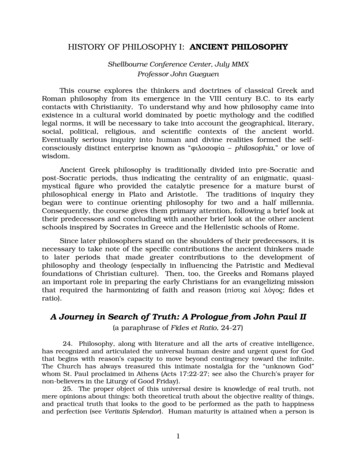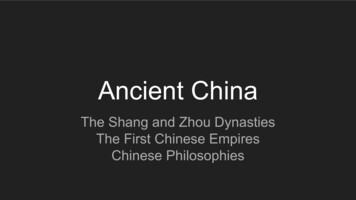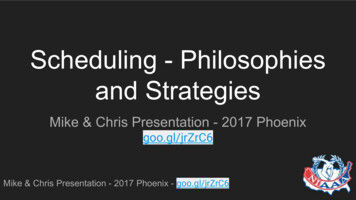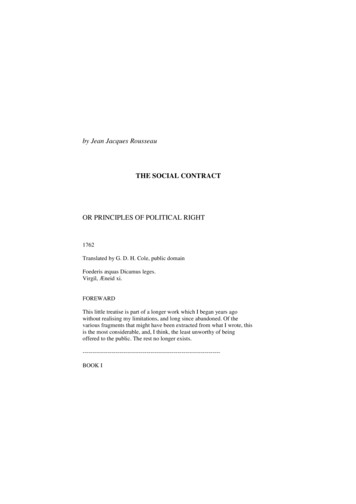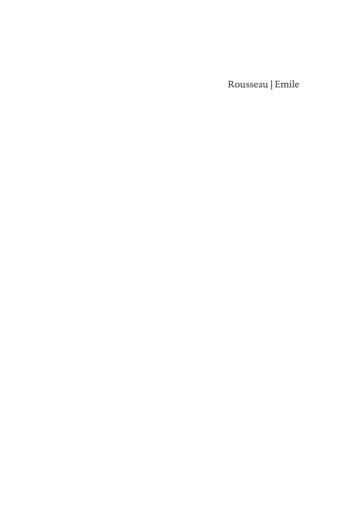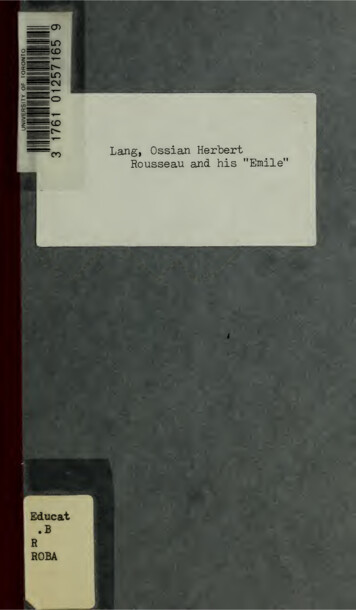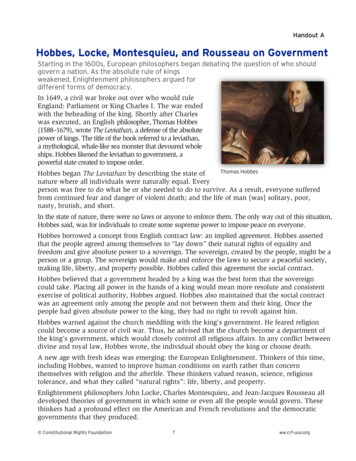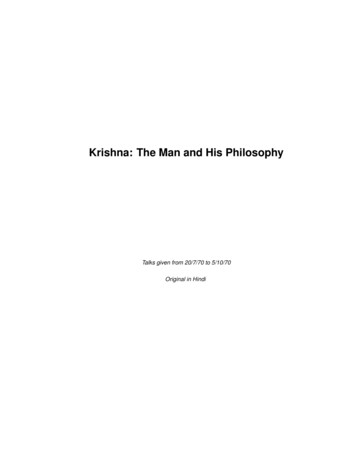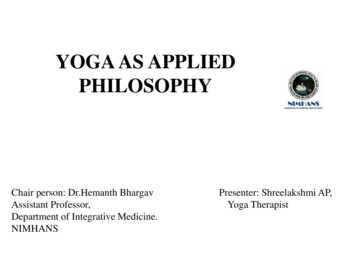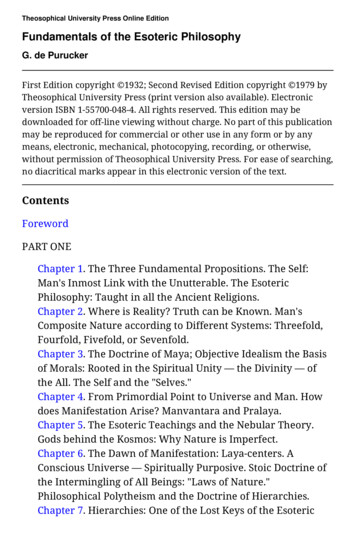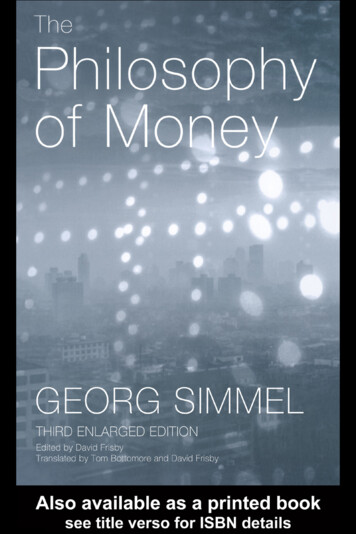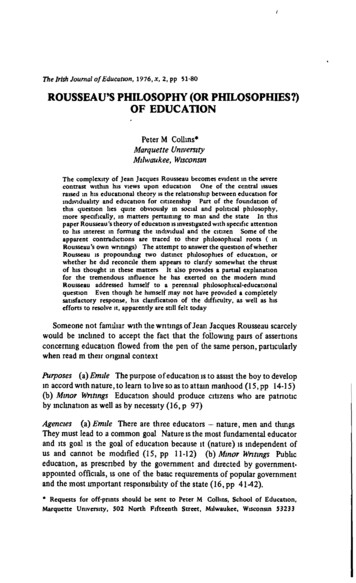
Transcription
/The Irish Jo u rn a l o f E du cation , 1976, x , 2, pp 51-80ROUSSEAU’S PHILOSOPHY (OR PHILOSOPHIES?)O F EDUCATIONPeter M Collins*Marquette UniversityMilwaukee, WisconsinThe complexity o f Jean Jacques Rousseau becomes evident in the severecontrast within his views upon education One of the central issuesraised in his educational theory is the relationship between education forindividuality and education for citizenship Part of the foundation ofthis question lies quite obviously in social and political philosophy,more specifically, in matters pertaining to man and the state In thispaper Rousseau’s theory of education is investigated with specific attentionto his interest in forming the individual and the citizen Some of theapparent contradictions are traced to their philosophical roots ( inRousseau *s own writings) The attem pt to answer the question o f whetherRousseau is propounding two distinct philosophies of education, orwhether he did reconcile them appears to clarify somewhat the thrustof his thought in these matters It also provides a partial explanationfor the tremendous influence he has exerted on the modern mindRousseau addressed himself to a perennial philosophical-educationalquestion Even though he himself may not have provided a completelysatisfactory response, his clarification of the difficulty, as well as hisefforts to resolve it, apparently are still felt todaySomeone not familiar with the writings of Jean Jacques Rousseau scarcelywould be inclined to accept the fact that the following pairs of assertionsconcerning education flowed from the pen of the same person, particularlywhen read m their original context(a) Emile The purpose of education is to assist the boy to developin accord with nature, to learn to live so as to attain manhood (15, pp 14-15)(b) M inor Writings Education should produce citizens who are patrioticby inclination as well as by necessity (16, p 97)Purposes(a) Emile There are three educators —nature, men and thingsThey must lead to a common goal Nature is the most fundamental educatorand its goal is the goal of education because it (nature) is independent ofus and cannot be modified (15, pp 11-12) (b) M inor Writings Publiceducation, as prescribed by the government and directed by governmentappointed officials, is one of the basic requirements of popular governmentand the most important responsibility of the state (16, pp 41-42).Agencies* Requests for off-prints should be sent to Peter M Collins, School of Education,Marquette University, 502 North Fifteenth Street, Milwaukee, Wisconsin 53233
PETER M COLLINS52Curriculum (a) Emile Until'the age of reason (about age thirteen), thechild will do right, not by following the prescriptions of persons, but byliving in accord with nature His present interests must dominate theeducational scene (15, pp 40, 52) (b) Minor Writings The form and theorder of the child’s studies should be determined by law (16, p 98)Methods (a) Emile The education of the young child should be purelynegative it should consist not in the inculcation of virtue and truth, but inprotecting the heart from vice and the mind from error, it should keep themind inactive as long as possible while exercising the body and the senses,and it should avoid verbal lessons in favour of experience In order to letchildhood ripen, experience and feeling should emerge as the real teachers(15, pp 4042) (b) Minor Writings In order to promote patriotism, thevirtues of courage and‘justice should be preached and taught by famouswarriors and upright judges (16, p 42)Authority (a) Emile The child should act not out of obedience, but onlyfrom necessity, he should not be given any orders nor allowed even toimagine the legitimacy of human authority (15, pp 37-39) (b) MinorWritings Instruction without authority and example is fruitless (16, p 42)Discipline (a) Emile Children should be left free to develop themselves ina suitable atmosphere, this is founded on the principle that the naturalinclinations are always right, that the human heart harbours no originalperversity (15, pp 16, 40, 42) (b) Minor Writings Children must beaccustomed to discipline from an early age (16, p 99) tSocial orientation (a) Emile Although the boy, at the age of fifteen, isfamiliar with the relationships between man and things, he neither knowsnor cares about the relationships between man and man The importanceof this is seen in that civilized man is a slave (15, pp 15, 93) (b) MinorWritings Children should be made to play together in public, moved torivalry and emulation in seeking a common end From an early age theyshould become accustomed to equality and fraternity, and to living underthe public eye and seeking public approbation They should learn to desireonly what the community wants and to become- the ,defenders of thecountry (16, pp 4142,99) **1'« How seriously opposed are these aspects of educational theory, onetending to support direct education for individualism, the other directeducation for citizenship9 Can they be reconciled7 Has Rousseau reconciled
ROUSSEAU’S PHILOSOPHY OF EDUCATION53them*7 Does he provide philosophical bases for each7 If so, do thesephilosophical principles form a consistent pattern9 Or, has Rousseauformulated two distinct philosophies of education9 Finally, what has thiseighteenth-century French philosopher contributed to the ‘modern mind’9These and related questions will be considered m an attempt to betterunderstand the philosophy and educational theory of Jean-Jacques Rousseauand possibly some philosophical and educational alternatives .confrontedtodayEDUCATION FOR INDIVIDUALISMSince Rouseau’s Emile has been thoroughly analyzed by variouscommentators, only a bnef summary and elaboration of selected principleswill be provided An attempt will be made to ascertain the relationshipbetween these educational ideals and pertinent philosophical principlesEducational theoryTo understand Rousseau’s view of education in Emile means tocomprehend ‘negative education/ as he uses the term Fundamental to thatnotion are his assertions that it is much more important to exclude vice anderror from the child’s life than to inculcate virtue and truth, and that theessential thing is to make the young child a good healthy animal, especiallyby allowing him as much freedom as possible According to Rousseau,education ought to consist less in precept than in practice, with attemptsto develop reason occurring much later than was the ordinary customIn fact, he claims that the educator should ‘do the opposite of what isusually done and you will almost always be right (15, p 41) 'This kmd of education is child-centered the process of education is to befocused upon the conscious needs of the child This basic concept, however,must be understood in light of Rousseau’s view of the stages of development(correspondmg to the five ‘books* of Emilej infancy (ages 0-5), boyhood(6-12), the approach of adolescence (13-15), adolescence (16-20), andmarriage/The child at each of these various stages has very different characteristicsthan he has at other stages, Rousseau maintains Two examples will illustratethis important pomt One is the, principle of the ‘intrinsic worth of thechild’, this concept is related to, but distmct from, the principle of thegoodness of the child at birth It signifies that the child is not a miniatureadult, but a bemg with characteristics somewhat unique to children, a
54PETER M COLLINSbeing of inherent worth and dignity for what he is now, not only for whathe will become later (15, pp 5-6) The author of Emile explains that‘childhood has its place in the scheme of human life We must view theman as a man, and the child as a child (15, p 34) * One practical reason headduces to support this contention is that children may not live to attainmanhood and so will have prepared unnecessanly for that state and willhave lost what happiness they could have experienced as children (15, p 33)For educational theory this demands that the goals of education beformulated in terms of the present, not the future Paradoxically, one preparesfor the future by refusing to look at the future, since one becomes a matureadult by living through each stage of his development For educationalpractice this means that the methods of educating adults are not thoseemployed with children (15, p 118)A second example supporting Rousseau’s view that students differradically at various stages concerns the development of reason (at aboutage thirteen) What constitutes the function called, reasoning9 Rousseaucontrasts sensation, which produces images, and reason, which producesideas Two differences appear Firstly, sensing is a purely passive process,and reasoning is an active one, and secondly, images are ‘exact pictures ofsense-given objects (15, p 46),’ while ideas are ‘notions of the objects deter mined by their relations (15, p 46) ’ In other words, sensing is a passiveprocess of ‘seeing’ individual sense objects, reasoning is an active process ofcomparing those sense images (15, pp 46-47) This enables Rousseau todefine an idea as ‘a sort of mixed or complex sensation (15, p 91) ’ Theawakening of reason coincides with the initiation of Emile’s readingAlthough Rousseau tends to deny or diminish the significance of books(15, pp 72-73, 83) he does give Emile a copy of Robinson Crusoe (and laterother books) m light of the fact that he can now reason The promotion ofreading does not appear to be an exception to his persistency in attributinga certain priority to sense awareness (15)At this point we will forego a systematic elaboration of the chronologicaldevelopment of Emile in order to pursue an analysis of four topics regardingRousseau’s direct education for individualism as expressed m EmileReferences are made to these four considerations (aims of education,educational agencies, curriculum and methods and teacher-student relation ship) in the contrasts portrayed m the introduction to these remarks, as aresult, this description will be relatively bnefIn Emile we find that the primary aim of education is to develop a man(15, p 14) Rousseau has no intention of directly preparing his young
ROUSSEAU’S PHILOSOPHY OF EDUCATION55pupil for a particular kind of work, rather, by preparing him for manhoodalone, he will necessarily be enabling him to undertake fruitfully the dutiesof a particular vocation (15, p 13)That is not the whole answer to the question of educational aims, ofcourse Perhaps even a more fundamental goal is happiness, that is, tolive well (which demands becommg a man) Furthermore, there are definitemeans to these ends, which means can be taken as ends, in a sense Tobecome a man, one must live in accord with nature, to be accomplishedthrough conforming one’s life to one’s ‘original inclinations (15, pp 11-12).’These inclinations are sought by means of the cultivation of one’s senses andfeelings (only the senses and feelings pnor to approximately age thirteen,primarily the senses and feelings after the onset of ‘reason'). , A verysignificant path to this intermediate goal is the provision of freedom,enabling the child to do as he desires (within certain limits)Therefore, the aims of Rousseau’s education for individualism include,m order of immediacy, the following to provide an atmosphere of freedom,to assist m the cultivation of the senses and feelings, to facilitate living inaccord with nature, to enable the realization of manhood, and to enhancethe possibility of happiness in life The last of these goals entails sociabilityas well as individuality, which raises one of the central questions in theseconsiderationsThe second topic, concerning the agencies of education, is integral to theactualization of educational goals According to Rousseau in Emile, thereare three educators — nature, men, and things The education of nature,men, and things are identified, respectively, with the ‘internal developmentof or faculties and organs,’ the *use we learn to make of this development,’and that which ‘comes to us from our experience of the things that affectus (15, p 11) ’ Human persons can control the first of these three not atall (or nearly so), the third to a limited extent, and only the second signif icantly (although that is doubtful) (15, p 12) The foremost educatoris nature — for two reasons firstly, the goal of education is nature’s owngoal, and secondly, only nature, among the three, is not able to be modified,which makes it the basis for determining the direction of the other two.Among men who educate, the father is the natural tutor of his sons (15,pp 18-19)The curriculum is the third of these considerations in Rousseau’seducation for individuality (15) What should be taught the young boy
56PETER M COLLINSobviously vanes somewhat as he grows older, however, there are someunderlying pnnciples, one of which is the centring of what is learned uponthe conscious needs of the individual This is the basis for a secondprinciple the necessary mdefiniteness (within limits) of the contents ofone’s education Because the foundation of education is the student’sexpenences and feelings m the particular situation, the educator hesitates topredefine what is to be learned In light of the latter’s awareness of develop mental psychology and the needs-of this particular individual, he must helpthe student meet situations as they unfold As a result, the kind ofknowledge most important for the teacher is knowledge of the child (andhis environment)Until the activation of the boy’s ability to judge (or reason), the onlyobject of awareness is that which can be sensed or experienced throughthe feelings The child is put into contact with the natural environment,not books After he begins to reason (about age thirteen), he is exposed tobooks and (eventually) such studies as art, history, literature, social science,and religion However, at all times the pnonty of sensation and feelingmust be borne in mind This, along with the student-centredness and therela
awakening of reason coincides with the initiation of Emile’s reading Although Rousseau tends to deny or diminish the significance of books (15, pp 72-73, 83) he does give Emile a copy of Robinson Crusoe (and later other books) m light of the fact that he can now reason The promotion of reading does not appear to be an exception to his persistency in attributing a certain priority to sense .
